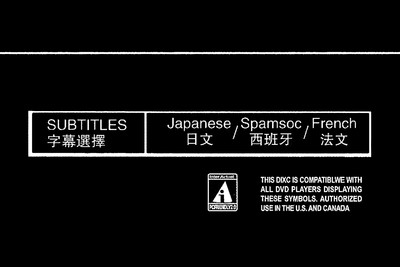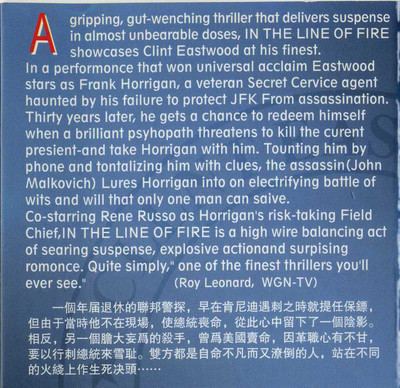A while ago I found a similar notice on the back of a DVD bought in Shanghai. This was my first encounter with a language called Spamsoc. It mostly looks like English, but is much more interesting.
Spamsoc consists of the derivative translations of synopses, credits, legal disclaimers, special features lists and other components of DVD covers produced in China. The production of Spamsoc follows diverse logics: some texts are made in complete look-a-like English; others earnestly translate some weirdo action film plots to conform to Confucio-socialist morals or historico-materialist sensibilities, others copy Wikipedia entries, or simply use Babelfish to create their blurbs. Similar languages exist on some Mexican and South-Asian DVD releases. Wherever DVD piracy exists, a form of Spamsoc comes into being.
This is a perfect example of Spamsoc from a Harry Potter DVD.
Spamsoc is clearly a broken language; a copy and paste lingo very often fabricated by online machine translation – but as a broken language it also speaks of the multiple tensions and pressures to which it is subjected. Just as the (usually pirated) DVDs on which it is published transgress the boundaries of legitimacy, Spamsoc alerts us to the limits of what can be made visible and said. What are we supposed to see and how? How are we supposed to speak and which articulations are deemed acceptable and legitimate? Who polices images, language and translation? Who owns pictures, words and their meaning?
Just as the imagery on pirated DVD covers is appropriated, cut up, remixed and photoshopped, the language is too. Just as the images produce surprising inclusions of actors who are not even in the film (see opposite page Lost in Translation), the language produces a surplus of signification, which is not contained by traditional grammar.
Spamsoc is created within multiple tensions: as we will see, conflicts over intellectual property rights, gendered and casualized labor, notions of cultural heritage and value as well as the rhetoric of the war against terror rip through jolly and exuberant movie synopses and wreak havoc. Spamsoc travels on the back of intercepted images and speaks of the struggles around them.
Thus Spamsoc is much more, than its usual condescending reception as ‘inferior English’ suggests. Certainly, this new English based language is a symptom of a deficiency which indicates a backwardness that has to be overcome, but this deficiency and backwardness is not the one of its authors, but our own. It is a language from the future, which unfortunately we yet fail to fully comprehend, but which already contains very important messages about contemporary social tensions. By failing to understand it, we fail to come into our present.
Spamsoc is a prism, which reflects disagreements over the meaning, ownership and circulation of sounds, images and languages. It illustrates hierarchies, which were created by the ‘English tsunami’ within China inundating social relations at all levels. According to translation theorist Jon Solomon “English is becoming progressively implicated in the constitution of social and class differences within China.”
Solomon also notes that “The quotidian guise of English is intrinsically excessive for highly mobile populations (such as Chinese labor) subjected to a new form of social segmentation partly based on English-language dominance at the global level”.1 Thus Spamsoc is produced within class hierarchies based on language proficiency. But it also reflects the multiple projections of in- and exteriority, ‘Westernness’ and ‘Chineseness’, which defines a cultural ideology “Through which Capital maintains hegemony in spite of acute social contradictions. Behind the culture-image industry’s look of authenticity lies a thoroughly transnational regime of production.”2
1. Catching the counterfeiters
“This DVD is authorized for sale or rent only in the country where terms of trade. Unauthorisedexchanging, hining, lending, pubic performance, diffusion. Laws with severe penalties and this video compact disc or any part there of is strictly prohibited.”
Licence on DVD: In The Line Of Fire Wolfgang Petersen (1993).
On pirated DVDs Spamsoc disclaimers about copyright are often especially interesting. They garble threatening language and mash up legal lingo. They combine a pastiche of legal phrases with utter disrespect for its meaning or its textual integrity. The letter of the law itself is mutilated, appropriated, garbled, mimicked, copied, scanned and pasted.
Within the legal disclaimers, the effects of automated scanner recognition intersect with mischief on the part of graphic designers. The permutation of letters stretches meanings until they collapse into negation. The public performance becomes a pubic performance, the law becomes a low.
But the pirated copy of In the line of fire is not only interesting because of the legal disclaimer on its cover. In the case of this movie, even the content of the DVD relates to the context of Spamsoc by touching upon the history of copyright enforcement.
What is the content of In the line of fire?
The film stars Clint Eastwood as a Secret Service agent who has failed to protect President John F. Kennedy from assassination and is now facing a new threat from a crazy killer. In one flashback scene original imagery of JFK´s murder is digitally combined with old Eastwood fiction films to suggest that his character was involved in the scene. Documentary material and fictional footage are mixed. And in the documentary part of the footage, a person named Jack Valenti comes into play.
Cut to reality:
“Without a trace of warning, the car in front of us accelerated from eight miles an hour to eighty. The whole spectacle turned bizarre, like an arcade game run amok, as we drove madly toward or away from some unnamed terror.”
(from the Memoirs of Jack Valenti)
On the day of John F. Kennedy’s assassination, Jack Valenti sits in the sixth car of the motorcade. He is an assistant to Lyndon B. Johnson, who will be sworn in as President on board Air Force One a few hours later. He also appears in the famous picture of the ceremony. Valenti is then instantly drafted as a special assistant to the new President.
As assistant to Lyndon B. Johnson, Valenti was so loyal that it was once said: "If LBJ dropped the H-bomb, Valenti would call it an urban renewal project."3
But how is Jack Valenti related to Spamsoc?
As head of the MPAA (Motion Picture Association of America) Valenti later became well known for trying to protect Hollywood copyrights from technological innovation. The Sony Betamax format seemed a special threat to him, because copying films was now possible for individual consumers. In 1982 he famously told a congressional panel, "I say to you that the VCR is to the American film producer and the American public as the Boston Strangler is to the woman home alone."[4]
The digital revolution especially inspired Valentis imagination.
Now, DVD piracy came to the top of the agenda. A Youtube clip shows him stating a single sentence: “Piracy (..) is a cancer in the belly of the film business”.
After 9/11 the tone became even more strident. Valenti and others started claiming that piracy funded international terrorism.
“Behind the army of hijackers, suicide bombers, and terrorist gunmen stands an even greater number of ‘company men’– criminal entrepreneurs and financiers in suits who understand the best way to bankroll Armageddon is through the capitalist system.
They run what look like legitimate businesses, travel to ‘business meetings’ in Frankfurt, Amsterdam, and New York, and pay fictional ‘employees’ with money that feeds and houses terrorist cells. They run computer manufacturing plants and noodle shops, sell ‘designer clothes’ and ‘bargain-basement’ CDs. They invest, pay taxes, give to charity, and fly like trapeze artists between one international venture and another. The endgame, however, is not to buy a bigger house or send the kids to an Ivy League school – it's to blow up a building, to hijack a jet, to unleash a plague, and to kill thousands of innocent civilians.” 4
The rhetoric of the War Against Terror is copied and pasted onto bourgeois core ideology as the protection of private property. The examples used are extremely colorful:
“New York's Joint Terrorist Taskforce reported a counterfeit T-shirt ring had used sales profits to subsidize the bombing of the World Trade Center in 1993. In 1999, an International Chamber of Commerce official reported the IRA was financing its operations by selling pirated videos, including a copy of The Lion King.” 5
Chinese DVD version of The Loin King II
Strong pressure from the US Government and the MPAA resulted in several massive clean-ups of the Chinese DVD market and a few high profile arrests of DVD online traders. Jack Valenti was also suspected of having exerted some influence in the arrest of Jon Johanssen, a Norwegian teenager who helped program DeCSS, a program that can unscramble encrypted digital video disks (DVD) on computers running Linux-based operating systems.
"The principle occupation [of the MPAA] is to make sure that American movies move freely and unhobbled around the world," Valenti said in defense of the case.6
Cut back to fiction.
Valentis persona as anti-piracy law enforcer is mirrored by Clint Eastwood’s character in the movie In the Line of Fire. After JFK´s murder, Clint Eastwood is transferred to an anti-counterfeiting unit. A short documentary feature Catching the Counterfeiters is included into the Special Features of the DVD of the film. But on the pirated version bought in Shanghai this feature is missing.
The example of In the Line of Fire shows the political context of the production of Spamsoc. Spamsoc is created in a geopolitical field of tension which is defined by the notion of private property of sounds and images and various attempts to defy this notion of property. The copy and paste collages of Spamsoc express the contradictions of this condition.
Intermezzo: A Shanghai Document
The question of copyright already features in one of the first famous documentary films about Shanghai: A Shanghai Document, made in 1928 by Soviet filmmaker Jakob Blyokh. Lauded and distributed worldwide as the first ever example of an activist film, it juxtaposes the posh lives of Western colonialists with the brutal living and working conditions of the Chinese population.7 It makes ample use of parallel montage to evoke the strong contrast between the daily lives of the different classes. But as the film was distributed in Western Europe, it was reedited by local distributors and even labeled as their ‘own’ production. Even the original authors of the film were replaced with new ones in the newly reedited versions. In this and other cases the Soviet directors protest against this case of unauthorized appropriation. They see it as a case of theft of intellectual property in the most bourgeois sense. Several versions of this film by several authors and with partly contradictory political messages came into circulation.
Thus, the Shanghai Document documents not only an aspect of colonial Shanghai. It is also a testimony to one of the world’s first copyright struggles around the property of sounds and images.
2. Translation
While struggles around copyright are one of the major issues inscribed into Spamsoc, it also reflects the conditions of gendered and casualized labor
(Insert cover turn left turn right here)
This DVD cover of the film Turn Left, Turn Right (HK2003) alerts us to the context of Spamsoc production. The film is the love story between a violinist and a translator of German and Polish literature, who keep missing each other. Of course it is not by John Frankenheimer and even less by John Frankenhemer, but by Johnnie To and Wai Ka-Fai.
Its Spamsoc synopsis is much more interesting than this feel-good-pan-Asian-rom-com though. By pointing out the “market popular terror of compelled translation” faced by the female lead, it gives us a stark image of the economic conditions of translation, perhaps even those that lead to the production of Spamsoc in the first place: “The addict toes the text word that she translate poem the world, but usually need. goto for the sake of the market popular terror of compelled translation novel and because of Excessive input but usually make the spirit the strain.”
I asked my colleague and expert Jon Solomon how to comprehend those conditions:
“First, there is an economy in the division of labor. The separate tasks of copy editing and layout design are, in this kind of pirate operation, usually combined. Although the work might not be paid at a piece rate, there is surely the same pressure here as in other parts of the translation industry to produce at a definite rate of output. Second, the division of labor is gendered. Although I cannot cite any figures, I would wager that over 90% of the designer/copy editors who actually produce these DVD covers are educated urban females who are literate — but not necessarily professionally trained — in both desktop publishing software and English. Third, the market for these DVDs faces stiff competition from P2P downloading. Packaging (and ease of obtaining the discs without a trace) is an important source of value-added attraction to these products.” 8
The conditions of translation are clearly described in the synopsis: excessive input, strained spirits, the frustrated desire to translate poem the world, but having to go for the compelled translation instead.
Spamsoc reflects all these working conditions: the gendered collapse of the division of labor, long working hours, the blurring of the border between translation and design, between working on words and working on pictures, the equivalence created between all sorts of different files and data, which are intercepted, ripped and copied and pasted on top of each other. But translation is also a work that creates contact and communication, an affective labor.
3. Columbia/Universal
Let’s return to the legal disclaimer from the beginning. What could the term: “a pubic performance” mean? Firstly, it is a misspelling caused by automated scanner recognition, that is, a technical problem. But what if we consider this misspelling a Freudian slip caused not by an individual psyche but by a whole system of visibility and meaning? A manifestation of the ‘unconscious’ of a technological, economical and geopolitical constellation? Let’s take this Freudian slip seriously and reconstruct its underlying dynamics.
The word pubic appears to be a displacement of the word public. What happens in the transition from a public condition into a pubic one? The pubic sphere (as a part of the body) is usually not public at all, but very private. Another word for the pubic sphere is even private parts. In the substitution of the public condition with the pubic, a strange collapse between the public and the private takes place. The shift mirrors the transformation of the character of audiences by the introduction of home DVDs. Before the digital turn, films were still widely watched in cinemas. The home DVD almost killed off the theatrical space of the cinema. The theater scene is intrinsically linked with metaphors of public space in political theory. The pubic sphere is thus different from the traditional public sphere. It is a private sphere turned public and vice versa. A space where films are not only watched, but appropriated, redesigned, reedited, copied and pasted and translated into Spamsoc.
One of my favourite details on the Spamsoc DVD version of In the Line of Fire includes the company trailer in the beginning. While we clearly see the logo of Columbia Pictures, we simultaneously listen to the sound of the jingle of Universal Pictures. Somebody took the care to combine both of the trailers. It is this attention to detail, which is so compelling in many Spamsoc DVD releases. By exchanging the jingle, and thus ‘universalizing’ Columbia’s property, these sounds and pictures are released from their status as commodity and set free to roam around the globe evoked in classical Universal company logos. But the logo is not simply articulating a simple pretense to universality. It remains set in an indeterminate space between Columbia and Universal, that is between a colonial space referencing Christopher Columbus and a universal space of enlightenment, or more precisely between colonial vision and universal sound. Both types of spaces are inextricably linked historically. The pompous enlightenment odes to universal mankind are invented within a social order firmly rooted in slavery and colonial subjugation. Universal and Columbia are like the back side of each other. No universalism without colonialism and vice versa. The company logo expresses the tension between those spaces. How do they figure in a world of errant images? While sounds and images are able to travel more freely than ever, strong efforts are made to reterritorialize them. While the universalizing dynamics of globalized media pushes images out into the world, the forces of cultural and economical colonialism are pulling them back towards controlled circuits of circulation. Spamsoc as a language in translation is caught up in these contradictory forces and torn in diverging directions.
So how do we think of Spamsoc DVDs? As pubic property instead of private property? As a form of property that is neither public nor private? Both film heroes and nameless translators share this pubic space, relentlessly crossing the border between fact and fiction, translation and fabulation, between colonial and universal spaces. But the pubic sphere of Spamsoc is not just defined by pure imagination. On the contrary, it is set at a point of transgression where the imaginary spills over into political reality.
- Mission Imbpossible - Jon Solomon in Conversation with Hito Steyerl about the Project „DeriVeD“ eipcp.net/transversal/0908/solomon-steyerl/en↩
- Mission Imbpossible - Jon Solomon in Conversation with Hito Steyerl about the Project „DeriVeD“ eipcp.net/transversal/0908/solomon-steyerl/en↩
- Mission Imbpossible - Jon Solomon in Conversation with Hito Steyerl about the Project „DeriVeD“ eipcp.net/transversal/0908/solomon-steyerl/en↩
- Financing Terror
- Profits from counterfeit goods pay for attacks
- By Kathleen Millar, Public Affairs Specialist, Office of Public Affairs
- US Customs November 2002↩
- Financing Terror
- Profits from counterfeit goods pay for attacks
- By Kathleen Millar, Public Affairs Specialist, Office of Public Affairs
- US Customs November 2002↩
- Studio technician
- MPAA president Jack Valenti has never downloaded an MP3,
- but he could have a huge impact on the future of online entertainment. http://archive.salon.com/tech/view/2000/02/14/valenti/index.html↩
- All informations about “A Shanghai Document” are from Thomas Todes excellent text : “Wie man einen Film shanghait. Die Umarbeitung eines sowjetischen Dokumentarfilms durch den Volksfilmverband: Das Dokument von Shanghai (1928)” In: Filmblatt 38/2008. Pp23-30.↩
- Mission Imbpossible - Jon Solomon in Conversation with Hito Steyerl about the Project „DeriVeD“ eipcp.net/transversal/0908/solomon-steyerl/en↩



